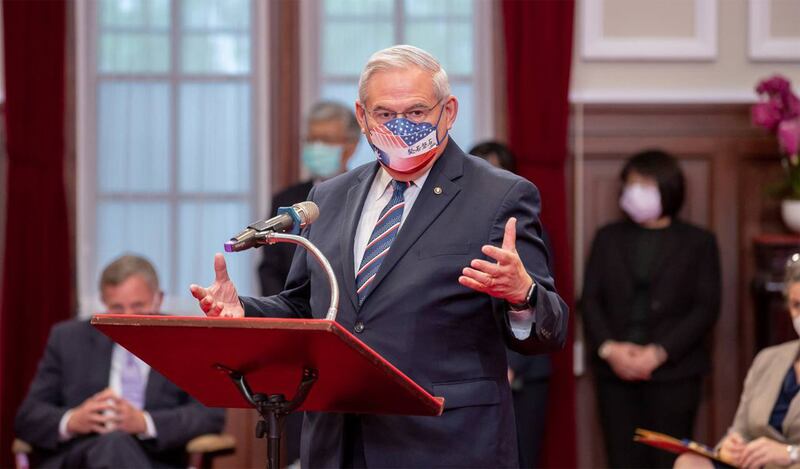Taiwan has expressed its “sincerest gratitude” to the U.S. Congress after the Senate Foreign Relations Committee passed a bill that would see a boost in military aid to the democratic island amid China’s increased aggression.
The Taiwanese Ministry of Foreign Affairs said in a statement on Thursday that with the newly approved “Taiwan Policy Act of 2022,” the U.S. has shown its commitment to “comprehensively enhancing Taiwan - U.S relations.”
The ministry also said it hoped that “the legislation will be pushed forward and deepened” at upcoming sessions of Congress.
Taiwanese political analyst Wong Ming-hsien, a professor at the Tamkang University in Taipei, told RFA Mandarin Service that, from a legal perspective, if and when it becomes law, the bill would be “the biggest adjustment in U.S. policy toward Taiwan in the past forty years.”
“It will provide a clear-cut framework for the interaction between the U.S., China, and Taiwan, which is more important than the original Taiwan Relations Act in 1979 and the so-called Six Assurances as a legal basis to allow the U.S. executive branch to handle U.S.-Taiwan relations without being constrained by U.S.-China relations,” Wong said.
The Six Assurances are six key principles of U.S. foreign policy regarding U.S.-Taiwan relations, adopted as “formal but not directly enforceable” by Congress in 2016.
The "Taiwan Policy Act of 2022," authored by Senators Bob Menendez and Lindsey Graham, aims "to reinforce United States policy towards Taiwan in order to maintain stable cross-Strait deterrence as China expands its campaign to undermine the status quo," said a press release from the Senate Foreign Relations Committee.
Menendez, who led a Senate delegation to visit Taiwan and meet with Taiwanese President Tsai Ing-wen in April, said in the release that “the primary focus of this bill has always been on deterrence and on enhancing Taiwan’s capabilities.”

Big increase in military financing
It would provide U.S. $6.5 billion in military aid to Taiwan through 2027, a U.S. $2 billion increase from the U.S. $4.5 billion through 2026 proposed in the initial bill.
There were also some amendments to the initial proposal, such as in the provision that would designate Taiwan as a "major non-NATO ally" for the purposes of expediting arms sales.
Taiwan has accumulated a backlog of U.S. $14.2 billion in military equipment that it bought from the U.S. in 2019 but has yet to receive due to the COVID pandemic and the war in Ukraine.
The amended version instead states that “Taiwan shall be treated as though it were designated a major non-NATO ally for the purposes of the transfer or possible transfer of defense."
Essentially, the “Taiwan Policy Act of 2022” would require the departments of Defense and State, as well as defense manufacturers to “prioritize and expedite” foreign military sales for Taipei, despite the latter not being a major non-NATO ally.
Analysts say this new language allows Taiwan to receive the same benefits as the U.S.’s main non-NATO allies without a formal recognition of Taiwan’s sovereignty, a gesture that would severely provoke China.
Another provision about renaming Taiwan's de facto embassy in Washington, currently the "Taipei Economic and Cultural Representative Office," to the more official "Taiwan Representative Office" was also removed.
China’s reaction
Before the Senate Foreign Relations Committee voted on the bill, the White House expressed concerns about some of the elements that may be deemed as “radical.”
National Security adviser Jake Sullivan said during an interview with Bloomberg last week that the draft bill contained elements that are “quite effective and robust; that will improve Taiwan's security” but also “other elements that give us some concern."
Sullivan said he’d meet with congressional leaders to discuss the text.
China has yet to react to the passing of the bill but its representatives have spoken out against the Taiwan Policy Act.
"The Chinese side has repeatedly expressed its firm opposition to the 'Taiwan Policy Act of 2022'," said Chinese Foreign Ministry spokesperson Mao Ning on Wednesday.
“The U.S. side needs to abide by the One-China principle and the provisions of the three China-U.S. joint communiqués and stop advancing the relevant Taiwan-related Act,” she told reporters in Beijing.
China has insisted that Taiwan is an inalienable part of China and responded angrily to U.S. support to Taipei.
When House Speaker Nancy Pelosi visited Taiwan in March, Beijing announced a major military drill in return.
The “Taiwan Policy Act of 2022” still needs to pass the Senate and the House of Representatives, and receive approval from U.S. President Joe Biden before the conclusion of the 117th Congress on Jan. 3, 2023, to become law.
Jill Lee from Taipei contributed to this article.
